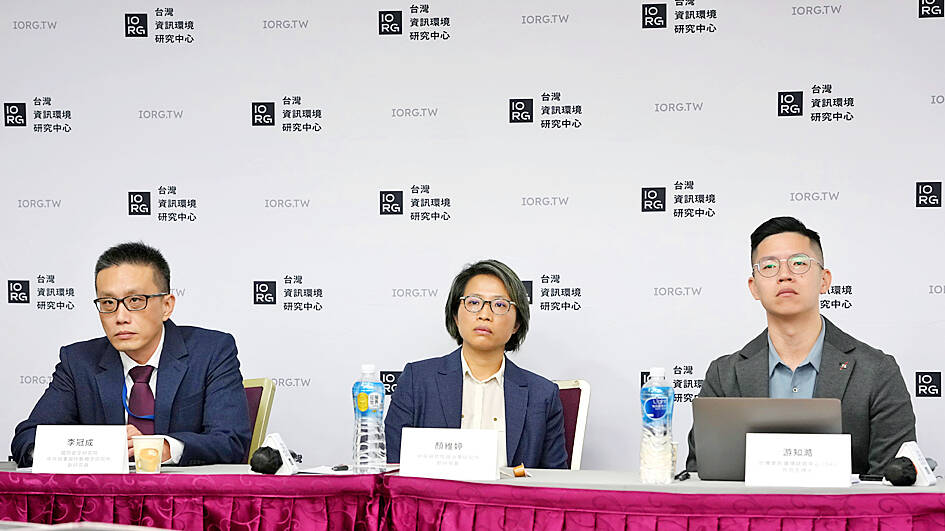Beijing is conducting a sophisticated campaign to demoralize Taiwanese by exploiting their economic anxieties and fear of war, a report released yesterday by a civil research organization showed.
China has been engaged in a systematic campaign to construct a narrative of “Taiwan defeatism” to encourage Taiwanese acquiescence, Information Operations Research Group codirector Yu Chih-hao (游知澔) told a news conference in Taipei.
The defeatist narrative is formed by framing news about Taiwan’s foreign affairs, national defense, economic issues and democracy with messaging that depicts the nation as weak and dependent on foreign powers, Yu said.

Photo: Chen Yi-kuan, Taipei Times
People who identify as both Taiwanese and Chinese have positive views of China’s economy and negative views of the Democratic Progressive Party government, and are more likely to accept defeatism, he said.
The types of issues Beijing seeks to leverage to spread defeatism reflect Taiwanese fears of being abandoned by allies, conflicted national identity and lack of education in national security matters, he said.
The defeatist worldview, built to dovetail with other Chinese information campaigns, creates a sense of crisis and then presents acquiescence to China as its solution, he said.
The promotion of defeatist messages is being timed to put a negative spin on specific events as they happen in real time, such as Taiwan’s annual Han Kuang military exercises, he said.
The vectors for Chinese propaganda include Taiwanese politicians and political pundits, social media accounts under the management of unknown organizations or individuals, Beijing’s leadership and state-run media, he said.
Chinese propaganda routinely quotes Taiwanese opposition figures, and makes use of idioms and phrases typically used in China to homogenize Taiwanese culture, language and public discourse, Yu said.
Citing a poll the center conducted last year, Yu said that 46 percent of Taiwanese are pessimistic about the nation’s economy and national security, suggesting a high level of potential susceptibility to Beijing’s propaganda.
TikTok users are more likely to approve of China and express pessimism about the economy, he said.
Chinese propaganda preys on anxiety and a sense of helplessness, especially in disinformation campaigns aimed at sowing division in Taiwan, he said.
The executive branch should enhance information governance, regulate the quality of open source media and emphasize critical reading skills in education, Yu said.
Academics should deepen interdisciplinary study of the information environment in Taiwan and promote public educational efforts, while Taiwanese should be more critical of the information they encounter online and base their discussion about public affairs on verifiable facts, he said.
The Information Operations Research Group seeks to spread public awareness about information manipulation.

NATIONAL SECURITY THREAT: An official said that Guan Guan’s comments had gone beyond the threshold of free speech, as she advocated for the destruction of the ROC China-born media influencer Guan Guan’s (關關) residency permit has been revoked for repeatedly posting pro-China content that threatens national security, the National Immigration Agency said yesterday. Guan Guan has said many controversial things in her videos posted to Douyin (抖音), including “the red flag will soon be painted all over Taiwan” and “Taiwan is an inseparable part of China,” while expressing hope for expedited “reunification.” The agency received multiple reports alleging that Guan Guan had advocated for armed reunification last year. After investigating, the agency last month issued a notice requiring her to appear and account for her actions. Guan Guan appeared as required,

Japan and the Philippines yesterday signed a defense pact that would allow the tax-free provision of ammunition, fuel, food and other necessities when their forces stage joint training to boost deterrence against China’s growing aggression in the region and to bolster their preparation for natural disasters. Japan has faced increasing political, trade and security tensions with China, which was angered by Japanese Prime Minister Sanae Takaichi’s remark that a Chinese attack on Taiwan would be a survival-threatening situation for Japan, triggering a military response. Japan and the Philippines have also had separate territorial conflicts with Beijing in the East and South China

A strong cold air mass is expected to arrive tonight, bringing a change in weather and a drop in temperature, the Central Weather Administration (CWA) said. The coldest time would be early on Thursday morning, with temperatures in some areas dipping as low as 8°C, it said. Daytime highs yesterday were 22°C to 24°C in northern and eastern Taiwan, and about 25°C to 28°C in the central and southern regions, it said. However, nighttime lows would dip to about 15°C to 16°C in central and northern Taiwan as well as the northeast, and 17°C to 19°C elsewhere, it said. Tropical Storm Nokaen, currently

PAPERS, PLEASE: The gang exploited the high value of the passports, selling them at inflated prices to Chinese buyers, who would treat them as ‘invisibility cloaks’ The Yilan District Court has handed four members of a syndicate prison terms ranging from one year and two months to two years and two months for their involvement in a scheme to purchase Taiwanese passports and resell them abroad at a massive markup. A Chinese human smuggling syndicate purchased Taiwanese passports through local criminal networks, exploiting the passports’ visa-free travel privileges to turn a profit of more than 20 times the original price, the court said. Such criminal organizations enable people to impersonate Taiwanese when entering and exiting Taiwan and other countries, undermining social order and the credibility of the nation’s